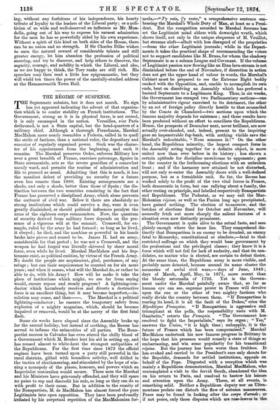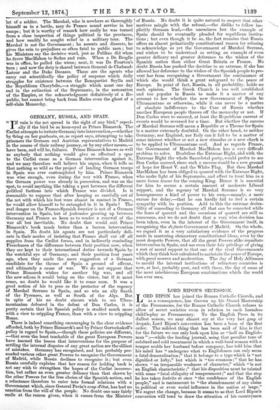THE REGIME OF SUSPENSE.
THE Septennate subsists, but it does not march. No sign has yet appeared indicating the advent of that organisa- tion which is to confer stability on French institutions. The Government, strong as it is in physical force, is not rooted, it is only encamped in the nation. Versailles, vice Paris dethroned, is not a State capital, but the head-quarters of a military chief. Although a thorough Frenchman, Marshal MacMahon more nearly resembles a Podesta, called in to quell the strife of factions, than a national ruler, the depositary and executor of regularly organised power. Such was the charac- ter of his appointment from the beginning, and such it remains The Marshal preserves Order, enforces Military law over a great breadth of France, exercises patronage, figures in State ceremonials, acts as the severe guardian of a somewhat unruly ward, and permits the routine of administration and life to proceed as usual. Admitting that this is much, it has the manifest defect of providing no security for a future even less remote than 1880. Existing arrangements are a shade, and only a shade, better than those of Spain ; the dis- tinction between the two countries consisting in the fact that France has preserved a disciplined Army, which alone prevents the outburst of civil war. Below it there are absolutely no strong institutions which could survive a day, were it even greatly diminisbsd, or should political influences paralyse the arms of the eighteen corps commanders. Now, the quantum of security derived from military force depends on the pre- sence of a vigorous will at the summit. Cromwell, for ex- ample, ruled by the army he had formed ; so long as he lived, it obeyed ; he died, and the machine so powerful in his hands broke into pieces and ceased to be. James If. had an army, considerable for that period ; he was not a Cromwell, and the weapon he had forged was literally shivered by sheer moral force, even while he lived. Marshal MacMahon and his Sep- tennate exist, as political entities, by virtue of the French Army. No doubt the people are acquiescent, glad, perchance, of any refuge ; but can their acquiescence be counted on for six more years; and when it ceases what will the Marshal do, or rather be able to do, with his Army? How will he make it take the place of institutions which might, we are far from saying would, ensure repose and steady progress? A lightning-con- ductor which harmlessly receives and diverts a destructive force is an excellent thing, but it may become imperfect,—in- sulation may cease, and then—. The Marshal is a political lightning-conductor ; he ensures the temporary safety from explosion of a mighty magazine, which, should he become impaired or removed, would be at the mercy of the first fatal flash.
Some six weeks have elapsed since the Assembly broke up for the annual holiday, but instead of soothing, the Recess has served to inflame the animosities of all parties. The Bona- partist success in Calvados has even stirred the chilly blood of a Government which M. Rouher lent his aid in setting up, and has roused almost to white-heat the strongest antipathies of the Republicans. For the first time since 1872 the official engines have been turned upon a party still powerful in the rural districts, gifted with boundless activity, well drilled in the tactics of electioneering, and stimulated by the hope of win- ning a monopoly of the places, honours, and powers which an Imperialist restoration would secure. These men the Marshal and his Ministers have grievously offended, and they will spare no pains to sap and discredit his rule, so long as they can do so with profit to their cause. But in addition to the enmity of the Bonapartists, M. de MacMahon has almost forced the pure Legitimists into open opposition. They have been profoundly irritated by his perpetual repetition of the MacMahonian for-
mula,—" J'y suis, j'y rests," a comprehensive sentence em- bracing the Marshal's Whole Duty of Man, at least as a Presi- dent. But the recognition accorded to Marshal Serrano has setthe Legitimist mind ablaze with downright wrath, which shows itself, not only in the unique eloquence of M. Veuillot, but -streams aloft—albeit with less disregard of the proprieties —from the other Legitimist journals; while in the Depart- ments it takes the practical shape of recommending the voters- not to support candidates like M. Bruas, for whom the shadowy Septennate is as a solemn League and Covenant. If the volume- of Legitimist passion now flowing like an Etna lava-stream is not diminished before the end of November, if discretion in action does not get the upper hand of valour in words, the Marshal's Cabinet must be prepared to see the Extreme Right bodily ranked with the Opposition, and, unable to accomplish its own ends, bent on dissolving an Assembly which has preferred a bastard Septennate to a Legitimate King. Thus, in six weeks, the Government has enraged two Parliamentary sections—one by administrative rigour exercised to its detriment, the other by an act of foreign policy directly hostile to that counselled by the Comte de Chambord—two sections upon which the famous majority depends for existence ; and these results have- been produced without an effort to conciliate the Republicans. Hence, the prospects of December next, never brilliant, are now actually over-clouded, and, indeed, present to the inquiring gaze an impenetrable fog-bank, with nothing visible save the Marshal's redoubtable, " Nous sommes " On the other hand, the Republican minority, the largest compact force in the Assembly acting together for a definite object, is more united now than ever before in its history; has shown a. certain aptitude for discipline unwelcome to opponents ; goes- to the country in the forthcoming elections with an unbroken front ; and if the harmony now attained be not disturbed, will not only re-enter the Assembly doors with a well-defined purpose, but as a formidable unit. So far, the Recess has worked solely to the profit of the two vital forces in France, both democratic in form, but one rallying about a family, the other resting on principle, and labelled respectively Bona.partists and Republicans. The Podestat, as we may call the Mac- Mahonian re'ginte, as well as the Fusion long ago precipitated, have gained nothing. The election of to-morrow, and the batches of elections fixed for October and November, will assuredly fetch out more sharply the salient features of a situation even now distinctly prominent.
The -Government is quite alive to the actual facts, and sees- plainly enough where the issue lies. They comprehend dis- tinctly that Bonapartism is an enemy to be dreaded, an enemy fatal to Monarchy, constitutional or absolute,—fatal to that restricted suffrage on which they would base government by the professions and the privileged classes ; they know it is a force which will not fail for lack of audacity, and that its can- didates, no matter who is elected, are certain to defeat theirs._ At the same time, the Republican array is more visible, and probably more detested, because around its name cluster the memories of awful civil wars,— days of June, 1848; days of March, April, May, in 1871, more recent than the bloody saturnalia of 1793. Yet is the Govern- ment under the Marshal painfully . aware that, so far as human eye can see, supreme power in France will devolve upon the one or the other of two mighty factions who really divide the country between them. "If Bonapartism is rearing its head, it is all the fault of the Dukes," cries the Republique Frangaise. "If Bonapartism is aggressive and triumphant at the polls, the responsibility rests with M. Gambetta," retorts the Francais. "The Government bets. resolved to fight the Imperialists," says its organ ; "Yes," answers the Union, "it is high time ; unhappily, it is the future of France which has been compromised." Marshal MacMahon undertook his now famous progress in Brittany in the hope that his presence would remedy a state of things so embarrassing, and win some popularity for his transitional re'gime. But the journey has been worse than fruitless. It, has evoked and carried to the President's ears only shouts for- the Republic, demands for settled institutions, appeals on behalf of the Pope. Disgusted with a reception which was- mainly a Republican demonstration, Marshal MnPMahon, who contemplated a visit to the fervid South, abandoned the idea on his return to Paris, and resolved to bestow his leisure and attention upon the Army. There, at all events, is- something solid. Neither a Republican deputy nor an Ultra- montane prelate can disturb the flow of autumn manceuvres. Peace may be found in looking after the corps d'armee; or- if not peace, only those disputes which are rose-leaves in the lot of a soldier. The Marshal, who is nowhere so thoroughly himself as in a battle' may do France sound service in her camps ; but it is worthy of remark how easily he was turned from a close inspection of things political in the provinces, and how readily he sought relief in a military tour. The Marshal is not the Government ; he assents and dissents' he
'yes the rein to prejudices so often fatal to public men ; but bis Ministers say the decisive word, just as Palikao did when he drove 'MacMahon to Sedan and ruin. When a De Broglie was in office, he pulled the wires; next, it was De Fourton's turn ; and now the duty is shared between General de Chabaud- ' Latour and the Duke Decazes. These are the agents who carry out scientifically the policy of suspense which daily struggles for .existence between the Bonapartist Scylla and the Republican Charybdis,—a struggle which must one day end in the extinction of the Septennate, in the restoration of the Empire, or the acknowledgment definitively of a Re- public but cannot bring back from Hades even the ghost of a self-slain Monarchy.































 Previous page
Previous page